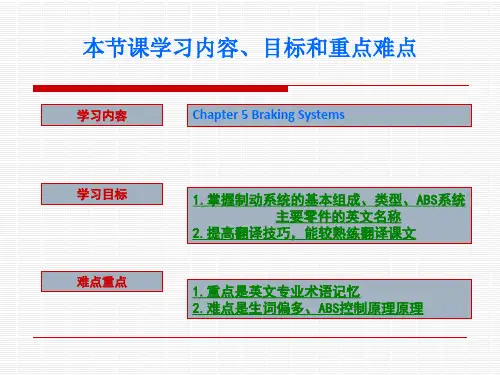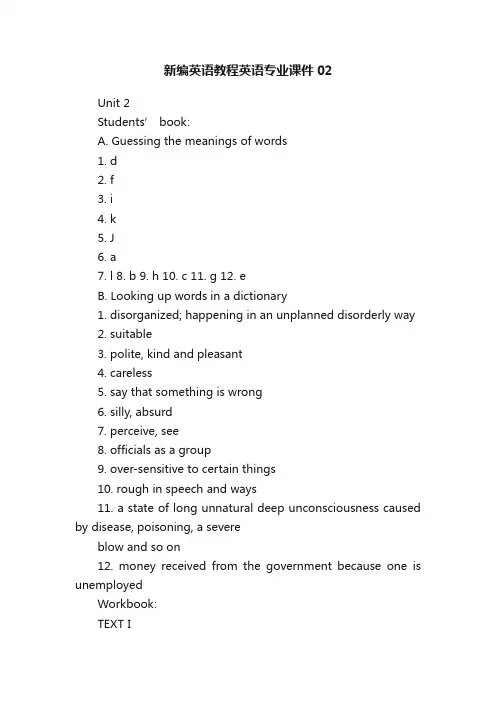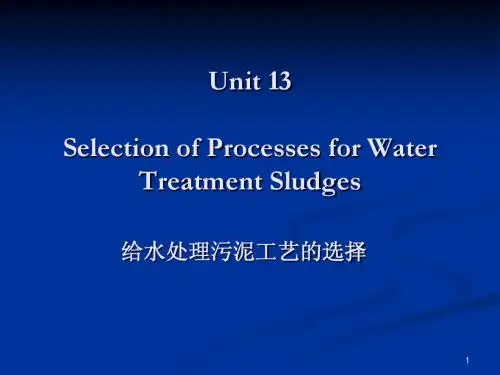专业英语基础课件
- 格式:ppt
- 大小:412.00 KB
- 文档页数:3




新编英语教程英语专业课件02Unit 2Students’ book:A. Guessing the meanings of words1. d2. f3. i4. k5. J6. a7. l 8. b 9. h 10. c 11. g 12. eB. Looking up words in a dictionary1. disorganized; happening in an unplanned disorderly way2. suitable3. polite, kind and pleasant4. careless5. say that something is wrong6. silly, absurd7. perceive, see8. officials as a group9. over-sensitive to certain things10. rough in speech and ways11. a state of long unnatural deep unconsciousness caused by disease, poisoning, a severeblow and so on12. money received from the government because one is unemployedWorkbook:TEXT IComprehension (reference versions):B. Reference version:1. The richer life experience we have, and the more people from all walks of life we know,we will develop more extensive and flexible knowledge of different English styles and the ability to use each style appropriately when the occasion arises.2. If we do not know when to use each style appropriately, or if we confuse one style withanother inappropriately, an unsystematic and casual knowledge of styles is of no use, or even worse.3. Neither "bags of fun" nor "extremely gracious" in its suitable context is a careless / casualexpression of one's ideas.4. It would, however, also be absurd/foolish to turn the judgment completely the other wayround.5. Except in cases where they are used to achieve humorous effect, contemporary writersthink that euphemisms are too disgusting, artificial and pretentious.6. Supporting the argument made by using the outdated and stereotyped phrases that arcoften used by trade union leaders would be as easy as shooting birds that never fly away.7. Some euphemisms are unusual enough to be funny. They are so unusual that they becomequite funny.8. Some people may also like extreme understatement.TEXT IIComprehension1. C2. C3. A4. B5. B6. CTEXT IIIComprehension1. F (The euphemistic term for "dustmen" in the U.S. simply sounds more prosperous. )2. T3. F (He is put in prison, but the name for prison is "adjustment centre". )4. F (There are, but the term "poor people" has been replaced by the euphemism: the "underprivileged". )5. F (There are more euphemisms in English than in many other languages. )GUIDED WRITINGSentence CombinationReference version:Proverbs, probably as old as our civilization, form an important part of our heritage. Children can learn basic lessons from them. For example, they may learn thrift by hearing a parent or grandparent say, "Waste not, want not." Young people tempted to be dishonest are often able to resist the temptation by recalling "Honesty is the best policy". Or persons faced with difficult tasks will be encouraged to persevere by keeping in mind that "Little strokes fell great oaks". And many tense situations are improved when one person or another remembers that "A softanswer turns away wrath", or that "Two cannot quarrel if one won’t".Proverbs are found in almost every language in the world, whether the language is written or not. In fact, where the language has not been written, proverbs are one of the principal ways the people pass down their philosophy of life from one generation to another, thus preserving their most precious heritage.IV. TranslationA. 1. An unknown disease affected his brain so badly that he lost his memory completely.2. The protesting crowds outside the courthouse had no effect at all on the judges and thejury of this Pacific island country.3. A guilty man apprehends danger in every sound.4. Her soft voice and gracious smile put everyone in the room at ease.5. Not until you have a good command of a scale of styles can you speak Englishappropriately in different situations.6. His haphazard knowledge of modern economics was one of the reasons why he failed inhis business.7. The new general manager did not feel very comfortable with the way he was addressedby his colleagues in the company.8. No matter how hard he had tried, his efforts to improve his image in the mind of thepublic proved to be ineffective.9. It was the last thing that occurred to the commander thathis soldiers would defy/disobey his orders.10. Although the composition teacher considers these expressions nothing but clich6s, theyappeal very much to the students.B. Reference version:We should always bear in mind that in different circumstances we use the English language in different ways. This fact, however, is often forgotten. When we think about language, we too often think only of the more formal forms, especially the written forms. But we are not always reading and writing. We use slang, or at least colloquial forms, with friends and acquaintances. In certain social situations, we use clich6s that we would probably blush to write down. We use polite speech when we speak to our elders or our superiors. We use high-sounding language on important occasions. We tell jokes and make comments about things or people near or far. We talk about ordinary things or of the secrets of the universe. We express feelings to one person or to a group. We choose slightly different forms of language for each of these purposes. For a native speaker of English, his choice is partly instinctive and partly based on an awareness of the kind of language that is expected of him. A good command of English must include an acquaintance with all these "registers".V. Blank FillingA. 1. a) died b)death c)dead d)deathly/deadlye)deadly f)deathlike/deathly g)dying2. a) judge b) judgment c)judges3. a)approaching b)approach c)approached4. a)argue b)argumentative c)argument5. a)observing b)observant c)observationsB. 1) countries 2) translation 3) communicate 4) Translators5) misunderstandings 6) universal 7) centuries/ages 8) language9) problem 10) realized 11) language 12) told 13) worked14) more/successive 15) in 16) on 17) Esperanto 18) same/fixed 19) countries 20) newspapers 21) books 22) created/developed 23) has 24) Esperanto25) universal/internationalC. 1.D 2. B 3. C 4. C 5. D 6. B 7. A8. B 9. A 10. D 11. B 12. D 13. A 14. C 15. DD.1. (1) described as (2) just as plainly(3) equals (4) get(5) as was often the case (6) approached a state of collapse and coma(7) done away with2. (1) described ... as (2) whereas(3) no more ... than (4) more ... the less(5) tire of (6) insisting(7) just (8) nothing but(9) was well aware (10) a slight feeling of guilt(11) as (12) address(13) acquire (14) unless(15) struck ... asVI. Possible responses for reference:1. Yes. Of course I will.2. Well, mm, yes, erh, perhaps not3. Yes. I'm afraid so.4. Oh yes, no problem.5. I'm afraid I won't, much as I like to.6. It certainly is.7. Indeed! Does he? 8. No. None at all.9. I'm sorry, I didn't. 10. No! I was not.Dictation:A. Word dictationsupple, haphazard, consistence, condemn, atmosphere,ridiculous, officialdom, administration, sufficient, appealingB. sentence-making with key phrases (reference versions)1. no more… than … : President Obama was no more a eloquent speaker than Governor Romneyin the first presidential debate.2. for all…: For all her efforts, she still failed to impress the interviewers in the final round.C. Paragraph dictation (14 sentences)We should always bear in mind that in different circumstances we use the English language in different ways. This fact, however, is often forgotten.When we think about language, we too often think only of the more formal forms, especially the written forms. But we are not always reading and writing. We use informal forms with families and friends. In certain social situations, we use clichés that we would probably blush to write down. We use polite speech when we speak to our elders or to our superiors. We use high-sounding language on important occasions. We tell jokes and make comments about things or people near or far. We talk about ordinary things or the secrets of the universe. We express feelings to one person or to a group. We choose slightly different forms of language for each of these purposes.For a native speaker of English, his choice is partly instinctive and partly based on an awareness of the kind of language that isexpected of him. A good command of English must include a knowledge of all these styles.Translation:1.英语有很多文体,我们必须掌握各种文体,并在不同场合使用不同的文体。





![计算机专业英语第4版课件 (1)[100页]](https://uimg.taocdn.com/5a0c14e5fd0a79563d1e722b.webp)

I. Soil Mechanics土力学Soil Particle土壤颗粒, Void孔隙, Void Ratio孔隙率, Porosity多孔性Phase Diagram Water Content含水量, Degree of Saturation饱和度Total Density总体密度, Dry Density干密度, Buoyant/Submerged Density浮密度, Saturated Density饱和密度Aeolian风积, Alluvial冲积, Colluvial Soil重积土; Collapsible Loess湿陷性黄土Coarse粗糙的, Coarse Grained (Sand, Gravel) Soil Texture土壤结构, Grain Size晶粒大小, Particle Size粒度Fine细小的, Fine-textured (Silt, Clay)Cohesionless无粘性, Sandy Soil砂土, Cohesive黏性的, Clayey Soil粘性土,Soil Classification Sand, Gravel砾石 (Coarse, Medium, Fine; Loose松的, Medium, Dense密的)Silt淤泥, Clay粘土 (Hard, Stiff, Medium, Soft), Organic Soil有机的, Peat泥炭, Mud泥浆Silty Sand粉土, Sandy Clay砂质粘土, Clayey Sand, Clayed SiltSieve Analysis筛分, Well-graded级配良好, Poorly-Graded / Uniform 粒度级配Grain Size Distribution, Gradation, GradingHydrometer Analysis比重计分析Immediate Settlement瞬时沉降Settlement Components Consolidation 固结(Normally Consolidated正常固结, OCR, Pore Pressure Dissipation孔压消散,Drainage Path排水路径)Secondary Compression/Consolidation二次压缩, Creeping蠕变Cohesion凝聚力, Friction Angle摩擦角, Constitutive Behavior本构形状Shear Strength of Soil Total Stress总应力, Effective Stress有效应力,Pore Pressure 孔隙压力(Hydrostatic/Excess/Negative Pore Pressure, Capillarity毛细现象)Stress Path (TSP, ESP)应力路径, Major/Minor Principal Stress, Mohr Circle莫尔圆Shear Dilation剪胀, Shear Compression, Critical Void Ratio; Liquefaction液化Quick Sand流砂, Seismic Loading地震荷载Lateral Earth Pressure侧向土压力: Rankine郎肯, Coulomb库伦, Active主动, Passive被动, K0 Condition, K0 Consolidation, Anisotropic/Isotropic Consolidation不等向固结, Homogenous, Retaining Wall挡土墙, Geosynthetics (Geotextile, Geomembrane, Geogrid土工格栅)Common Geotechnical Laboratory Tests: Atterberg Limits界限含水量 (Plastic Limit塑限, Liquid Limit液限), Standard/Modified Proctor Test击实实验, Hydraulic Conductivity Test渗透系数测试, Oedometer/Consolidometer固结仪/Consolidation Test, Unconfined Compression Test, Direct Shear Test直剪试验, Triaxial Test三轴压缩试验 (Unconsolidated-Undrained, UU, CU, CD) II. Foundation Engineering基础工程Shallow Foundation浅基础, Spread Foundation扩大基础: Independent, Strip/Continuous,Raft/Mat, BoxClassification of Foundation Skin Friction表面摩擦Deep Foundation/Pile Foundation深'桩: Driven Pile, Drilled Shaft钻孔桩井End-bearing端承Driven Pile贯入桩: Handling/Driven/Service Load, Pile Cap承台, Cushion, Splice, Pneumatic/Hydraulic/Vibratory Hammer气'液压'震动Drilled Shaft竖井: Drilling Rig钻机, Slurry泥浆, Drilling Fluid, Negative Skin Friction/Downdrag负摩阻力, Necking柱颈, BulgingSpecial Piles: Underreamed/Lateral/Batter/Uplift/Composite Piles抗拔桩'侧向桩'斜桩'上举桩'复合桩, Caisson pile灌注桩Exploratory Boring/Drilling钻探, Sampling (for Laboratory Testing)取样Site/Geotechnical Investigation Field Reconnaissance实地勘察, Site/Land Survey土地测量岩土勘察 In-Situ Test (i.e. Standard Penetration Test, SPT, Cone Penetration Test, CPT)Geophysical Exploration地球物理勘探Substructure基础, Superstructure上层建筑, Subgrade/Subsurface/Subsoil路基'地下的'天然地基下层土, (Allowable) Bearing Capacity承载能力, Bearing Pressure, Differential Settlement不均匀沉降, Subgrade Reaction地基反力, Soil-Structure Interaction, Analytical/Empirical Solution, Correlation Coefficient/Factor, Excavation, Backfill回填, Dewatering。
注意事项 (2)专业英语课程简介 ................................................................................................................ 错误!未定义书签。
Chapter 1 Matter and Measurement (2)1.1. Classification of Matter (3)1.2. Properties of Matter (3)1.3 Atoms, Molecules and Compounds (4)1.4. Numbers in Physical Quantities (5)1.5 Units of Measurement (8)1.6 The Dimensional Method (11)Word and sentence: (12)Chapter 2 Nomenclature of Inorganic Chemistry (13)2.1 Chemical Language (13)2.2 Nomenclature of Elements (14)2.3 Nomenclature of Inorganic Compounds (21)Chapter 3 Inorganic Chemistry (28)3.1 The Atomic Nature of Matter (28)3.2 Electronic Structure of Atoms (30)3.3 Periodicity of Atomic Properties (33)3.5 Molecular Geometry and Bonding Theories......................................................... 错误!未定义书签。
3.6 Chemical Reactions................................................................................................. 错误!未定义书签。